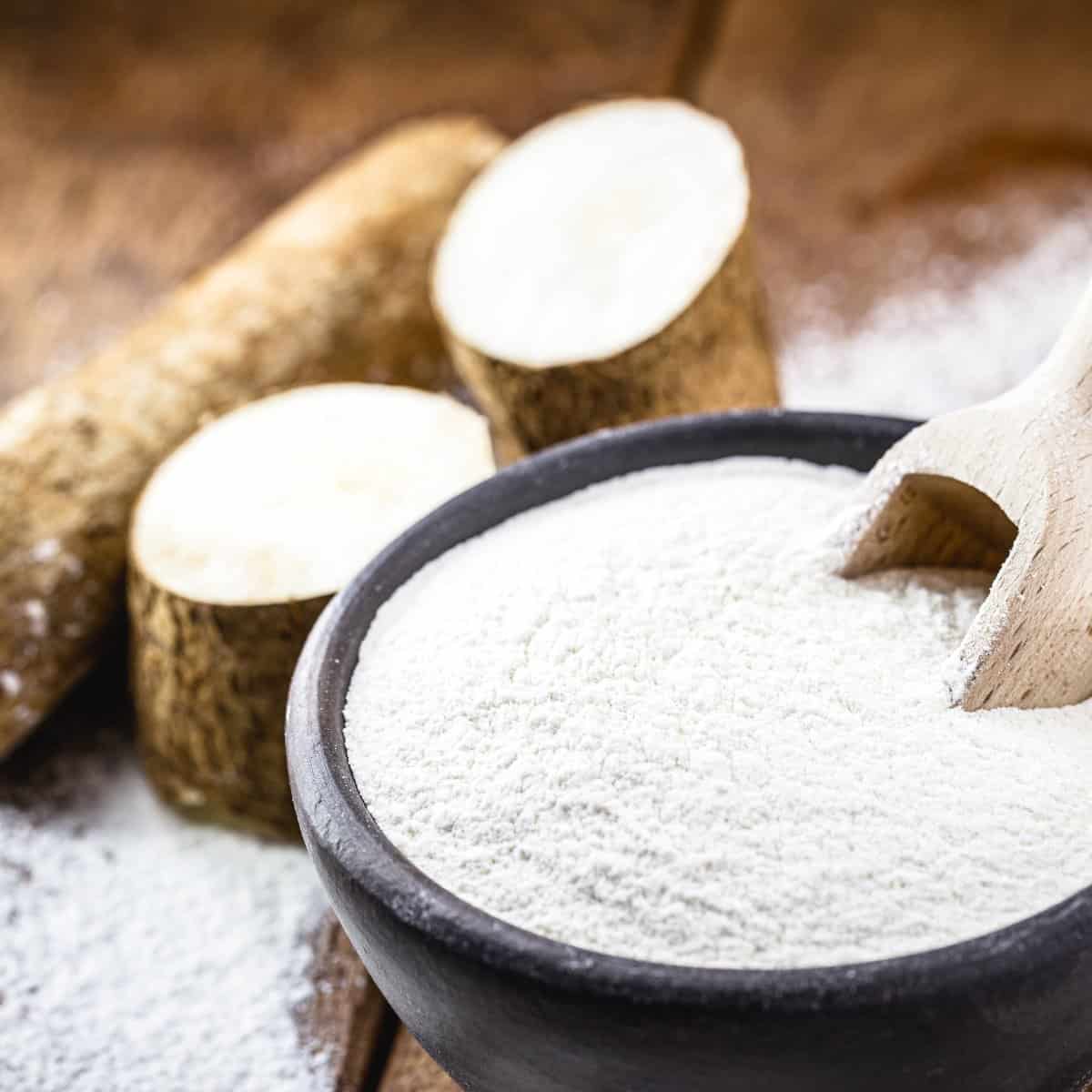Cassava Flour: How to Use It and What It Tastes Like
Cassava flour is a starchy flour made from the root of the cassava plant. It’s gluten-free and high in fiber, making it a popular alternative to wheat flour in baking and cooking.
It’s also known as tapioca flour, manioc flour, and yuca flour, and it’s used in both savory and sweet dishes. It has a neutral flavor that can be used to thicken soups and sauces, and it’s a great addition to any pantry.
Let’s look at everything you need to know about this versatile flour.


Check out our new cookbook
Bitemybun's family recipes with complete meal planner and recipe guide.
Try it out for free with Kindle Unlimited:
Read for freeIn this post we'll cover:
Get to Know Cassava Flour: A Versatile and Nutritious Alternative
Cassava flour can be used in a variety of recipes, including bread, pancakes, and pie crusts. It can also be used as a thickener in soups, stews, and sauces. Cassava flour is an excellent choice for those who are looking to increase their energy levels, protect their digestive health, and maintain a healthy weight.
How to Prepare Cassava Flour?
Preparing cassava flour involves a few simple steps. First, the cassava root is peeled and grated into small pieces. The grated cassava is then soaked in water to remove any toxins or compounds that may be present. After soaking, the cassava is dried and ground into a fine powder using a food processor or a mortar and pestle. The resulting cassava flour can be stored away in an airtight container for later use.
What are the Differences Between Cassava Flour and Regular Flour?
There are several differences between cassava flour and regular flour, including:
- Cassava flour is gluten-free, while regular flour contains gluten.
- Cassava flour has a slightly different texture and flavor compared to regular flour.
- Cassava flour has a lower carbohydrate and sugar content compared to regular flour.
- Cassava flour is a good source of fiber, while regular flour is not.
Where to Buy Cassava Flour?
Cassava flour can be found in most health food stores or online. When buying cassava flour, it is important to make sure that it is made from high-quality cassava roots and that it is free from any additives or preservatives.
What are Some Delicious Cassava Flour Recipes?
Here are some great recipes that use cassava flour:
- Cassava Flour Tortillas
- Cassava Flour Pizza Crust
- Cassava Flour Banana Bread
- Cassava Flour Pie Crust
- Cassava Flour Pancakes
What’s the Flavor of Cassava Flour?
Cassava flour has been gaining popularity as a substitute for wheat flour, especially among people who are gluten intolerant or follow a grain-free diet. But what does cassava flour taste like? Let’s find out.
The Versatility of Cassava Flour
- Cassava flour is a versatile food ingredient that can be used in a variety of dishes, including bread, cakes, cookies, and pancakes.
- It can also be used as a thickener for soups, stews, and sauces.
- Cassava flour is a low-carbohydrate and low-sugar food, making it an ideal choice for people who are watching their sugar intake.
- It’s also loaded with fiber, making it a great option for vegetarians and vegans who need to increase their fiber intake.
Get Creative in the Kitchen: Using Cassava Flour in Your Recipes
Cassava flour is an alternative to regular white flour that is highly versatile and excellent for small and large dishes alike. It is made from the cassava root, which is a starchy tuber that is a staple food in many countries. The root is ground into a fine powder, which consists mainly of starch and fiber. Cassava flour is a neutral, slightly sweet flour that is an excellent substitute for regular flour, cornstarch, or other starches.
Maintaining the Benefits of Cassava Flour
Cassava flour is an incredibly starchy food that is high in energy and fiber. It has a nutrient profile that is closest to that of a grain, making it an excellent choice for those who are looking for a healthy alternative to regular flour. Some other benefits of cassava flour include:
- Cassava flour is gluten-free, making it an excellent choice for those with celiac disease or gluten intolerance.
- Cassava flour is a good source of fiber, which can help to regulate digestion and promote feelings of fullness.
- Cassava flour is a convenient ingredient that can be used in a wide range of recipes.
To maintain the benefits of cassava flour, it is important to store it properly and use it in moderation. Cassava flour is a starchy food that can be high in calories, so it is important to use it in moderation as part of a balanced diet.
Why Cassava Flour is a Super Healthy Substitute
Cassava flour is a versatile and healthy alternative to traditional wheat flour. It is made from the entire cassava root, which is dried and ground into a fine powder. This process creates a flour that is similar in structure to wheat flour but contains more fiber and fewer carbohydrates. Cassava flour is also a good source of essential nutrients, including:
- Fiber: Cassava flour contains more fiber than traditional wheat flour, which can help improve digestion and lower cholesterol levels.
- Carbohydrates: While cassava flour does contain carbohydrates, it is a lower-carb alternative to wheat flour, making it a good choice for people on low-carb diets.
- Vitamins and minerals: Cassava flour is a good source of vitamins and minerals, including vitamin C, potassium, and magnesium.
How to Use Cassava Flour in Cooking
Cassava flour can be used in a wide range of recipes, from savory dishes to sweet treats. Here are some tips for using cassava flour in your cooking:
- Mix cassava flour with water to create a thickening agent for soups and stews.
- Use cassava flour as a substitute for wheat flour in baking recipes. Keep in mind that cassava flour is denser than wheat flour, so you may need to adjust the amount you use.
- Cassava flour can be used to make traditional dishes like cassava pie, which involves cutting the cassava into small pieces, boiling it, and then grinding it into a wet paste. The paste is then mixed with fresh coconut milk and baked into a delicious pie.
- Cassava flour can also be used as a substitute for other starches in recipes that require them, such as tapioca or potato starch.
Important Considerations When Using Cassava Flour
While cassava flour is a super healthy substitute, there are a few things to keep in mind when using it in your cooking:
- Cassava flour contains a number of natural toxins that can be harmful if not properly prepared. To reduce the risk of toxicity, it’s important to soak and cook cassava flour before consuming it.
- Cassava flour can turn sticky and gummy if not used correctly. To avoid this, it’s important to use the right amount of cassava flour and to mix it with other ingredients properly.
- Some types of cassava flour products may require additional help to achieve the desired texture. For example, some recipes may call for the addition of xanthan gum or other thickeners to help the cassava flour bind together.
- Cassava flour is ideal for cutting into small pieces or grinding into a fine powder, but it may not work as well for larger dishes that require a lot of flour. In these cases, it may be helpful to use a different type of flour or starch substitute.
Conclusion
So there you have it, Cassava flour is a starchy food ingredient made from the cassava root. It’s a great substitute for wheat flour and is perfect for baking delicious cakes and cookies. You can use it in many dishes, including pancakes and tortillas. So go ahead and give it a try! You won’t regret it!
Check out our new cookbook
Bitemybun's family recipes with complete meal planner and recipe guide.
Try it out for free with Kindle Unlimited:
Read for freeJoost Nusselder, the founder of Bite My Bun is a content marketer, dad and loves trying out new food with Japanese food at the heart of his passion, and together with his team he's been creating in-depth blog articles since 2016 to help loyal readers with recipes and cooking tips.
